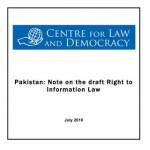 On International Right to Know Day, the Centre for Law and Democracy, in cooperation with Access Info Europe, are launching the first detailed analysis of the legal framework for the right to information (RTI) in 89 countries around the world.
On International Right to Know Day, the Centre for Law and Democracy, in cooperation with Access Info Europe, are launching the first detailed analysis of the legal framework for the right to information (RTI) in 89 countries around the world.
CLD and Access Info Unveil Global RTI Index
CLD and LRWC Issue Open Letter to Cambodian Government
 The Centre for Law and Democracy and Lawyers Rights Watch Canada have co-authored an open letter to the Cambodian government urging them to reconsider passage of their draft Law on Associations and Non-Governmental Organizations. The letter points out that the law in its current form violates international standards and serves to undermine the fundamental right of freedom of association. By imposing unduly broad and onerous requirements on all NGOs, the law has serious potential for abuse and is a particularly troubling development within the context of recent reports of administrative and judicial harassment of government critics in Cambodia.
The Centre for Law and Democracy and Lawyers Rights Watch Canada have co-authored an open letter to the Cambodian government urging them to reconsider passage of their draft Law on Associations and Non-Governmental Organizations. The letter points out that the law in its current form violates international standards and serves to undermine the fundamental right of freedom of association. By imposing unduly broad and onerous requirements on all NGOs, the law has serious potential for abuse and is a particularly troubling development within the context of recent reports of administrative and judicial harassment of government critics in Cambodia.
Comments on the Draft Model Law for AU Member States on Access to Information
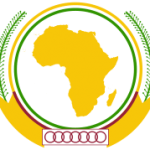 The draft Model Law for African Union Member States is being prepared by the Special Rapporteur on Freedom of Expression and Access to Information in Africa, in partnership with the Centre for Human Rights at the University of Pretoria. The African Commission on Human and Peoples’ Rights is calling for feedback on the draft Model Law and CLD, in partnership with the Egyptian Initiative for Personal Rights (EIPR), prepared these comments on it.
The draft Model Law for African Union Member States is being prepared by the Special Rapporteur on Freedom of Expression and Access to Information in Africa, in partnership with the Centre for Human Rights at the University of Pretoria. The African Commission on Human and Peoples’ Rights is calling for feedback on the draft Model Law and CLD, in partnership with the Egyptian Initiative for Personal Rights (EIPR), prepared these comments on it.
African Development Bank: Openness Proposals Fall Short
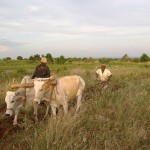 The African Development Bank (AfDB) is currently holding consultations with interested stakeholders regarding the ongoing review of its 2005 access to information policy. As part that process, a new draft policy, the African Development Bank Group Policy on Disclosure and Access to Information, was posted on the Bank’s website in June 2001. The Global Transparency Initiative (GTI) is a global network of civil society organisations, which includes CLD, and which advocates for greater transparency at the international financial institutions (IFIs). GTI has provided these Comments. As the Comments make clear, the new draft is a significant advance over the existing policy, but still fall far short of better practice by other IFIs and certainly the GTI’s own standards, as set out in the Transparency Charter for International Financial Institutions: Claiming our Right to Know.
The African Development Bank (AfDB) is currently holding consultations with interested stakeholders regarding the ongoing review of its 2005 access to information policy. As part that process, a new draft policy, the African Development Bank Group Policy on Disclosure and Access to Information, was posted on the Bank’s website in June 2001. The Global Transparency Initiative (GTI) is a global network of civil society organisations, which includes CLD, and which advocates for greater transparency at the international financial institutions (IFIs). GTI has provided these Comments. As the Comments make clear, the new draft is a significant advance over the existing policy, but still fall far short of better practice by other IFIs and certainly the GTI’s own standards, as set out in the Transparency Charter for International Financial Institutions: Claiming our Right to Know.
Comments on the Draft Law of Kazakhstan on Information Access
 The parliament of Kazakhstan is preparing a right to information law, following on from years of discussion about this important issue. These Comments by CLD analyse the most recent draft, noting that it has a number of important positive features, but also highlighting some significant shortcomings, such as the lack of an oversight body and an overbroad regime of exceptions (link to draft law).
The parliament of Kazakhstan is preparing a right to information law, following on from years of discussion about this important issue. These Comments by CLD analyse the most recent draft, noting that it has a number of important positive features, but also highlighting some significant shortcomings, such as the lack of an oversight body and an overbroad regime of exceptions (link to draft law).
Amending Access to Information Legislation: Legal and Political Issues
 Almost 90 countries around the world have enacted access to information (ATI) legislation, and in many of these countries, reforms and amendments are either being considered or have been passed. However, even minor adjustments to the legal framework around ATI laws can have substantial impact on how the law is implemented and used.
Almost 90 countries around the world have enacted access to information (ATI) legislation, and in many of these countries, reforms and amendments are either being considered or have been passed. However, even minor adjustments to the legal framework around ATI laws can have substantial impact on how the law is implemented and used.
While access to information laws are increasingly a key subject of studies on governance reforms, within the literature there has been less emphasis placed on the impact of amendments to ATI laws and little analysis done to understand the processes that propelled such reforms forward.
Targeted for practitioners working in governance and transparency issues and as part of its Governance Working Paper series, the World Bank Institute has recently published Amending Access to Information Legislation: Legal and Political Issues by Toby Mendel, Executive Director of Centre for Law and Democracy.
The working paper looks at the main substantive issues ATI reform attempts have targeted and what legal forms they may take. It also examines the role different actors—civil society, the media, oversight bodies, parliaments, and political leaders—can play in helping support the adoption of reforms that promote openness and defeat those that erect barriers.
Indonesia: Joint CLD-AJI Training for CSOs on FOI Law
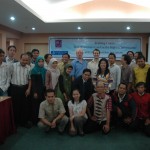 CLD and AJI have just completed three training sessions for journalists and civil society organisations in Jakarta, Surabaya and Lampung. The training seeks to build civil society demand for information under the Indonesian right to information law, which came into force last year. It is part of a wider programme on openness that CLD is conducting with a number of partners in Indonesia. The Participants’ Manual which CLD and AJI prepared for the training will now be updated and finalised.
CLD and AJI have just completed three training sessions for journalists and civil society organisations in Jakarta, Surabaya and Lampung. The training seeks to build civil society demand for information under the Indonesian right to information law, which came into force last year. It is part of a wider programme on openness that CLD is conducting with a number of partners in Indonesia. The Participants’ Manual which CLD and AJI prepared for the training will now be updated and finalised.
“This is the first training on the right to information for journalists and CSOs in Indonesia”, said Nezar Patria, President of AJI Indonesia. “We hope that it will help build the capacity of these actors to use the new right to information law.”
“Demand for information has been relatively low in Indonesia so far, considering the size of the country and the fact that both the media and civil society sectors are very developed,” added Toby Mendel, Executive Director of CLD. “These groups work in a large number of different areas and we hope that they start to spread demand more widely in their sectors.”
CLD and AJI hope to follow up the training with a programme of making requests for information in different parts of the country, and then by reporting on the results. We welcome any comments on the draft Manual, which we aim to finalise by the end of July.
More information on the project is available at here.
The draft version of the manual can be downloaded in English and in Bahasa Indonesia.
Joint Declaration on Access to the Internet
The popularization of the internet has revolutionized the concept of free expression by providing unprecedented opportunities for the communication of ideas. In order to assist legislators, judges, and civil society groups in adapting to this new reality, the Centre for Law and Democracy participated in drafting the 11th Joint Declaration by the four specialized mandates of the UN, OAS, OSCE and African Commission tasking with promoting and protecting freedom of expression. The Declaration is also available in Russian, Spanish and Arabic.
The strongly worded Declaration notes that many States actively seek to control the Internet and that good faith attempts at regulation often work to undermine freedom of expression. It also recognizes access to the internet as a right, and sets out detailed standards regarding freedom of expression and the Internet. CLD hopes that this statement will encourage states to take concrete measures to promote and protect universal access to the Internet.
The Joint Declaration was unveiled at a ceremony in Budapest on 1 June 2011. Video coverage of the press conference, as well as interviews with key participants, is available here:
Defining the Scope of National Security – An Issues Paper
 It is legitimate for states to exempt information whose release would be prejudicial to national security from their disclosure laws. But in order to insure that this exemption is not abused it is important to develop an acceptably narrow definition of what constitutes national security.
It is legitimate for states to exempt information whose release would be prejudicial to national security from their disclosure laws. But in order to insure that this exemption is not abused it is important to develop an acceptably narrow definition of what constitutes national security.
To this end, the Centre for Law and Democracy has produced a paper examining how national security should be defined in the context of information disclosure. The paper, available here, was produced as a contribution to the “Principles on National Security and the Right to Information” currently being developed by the Open Society Initiative.
Public service broadcasting: a comparative legal survey
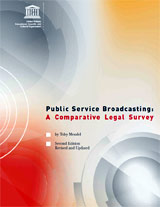 The Centre for Law and Democracy is pleased to announce the publication of the second edition of “Public Service Broadcasting: a comparative legal survey”. This edition, authored by CLD’s Executive Director Toby Mendel, explores the legal and regulatory systems governing public service broadcasters in eight different countries around the world. The book examines how different democracies protect the independence of public broadcasters while providing them with the resources necessary to fulfill their mandates.
The Centre for Law and Democracy is pleased to announce the publication of the second edition of “Public Service Broadcasting: a comparative legal survey”. This edition, authored by CLD’s Executive Director Toby Mendel, explores the legal and regulatory systems governing public service broadcasters in eight different countries around the world. The book examines how different democracies protect the independence of public broadcasters while providing them with the resources necessary to fulfill their mandates.
The launch took place at the World Summit on the Information Society Forum on 18 May 2011 in Geneva, Switzerland. UNESCO, which is publishing the book, stated that they expected it to “serve as an authoritative source of information from countries around the world, as a friend for broadcasters to help them solve some of the issues they are currently facing in their own organizations.”
This publication can now be accessed for free on UNESCO’s website.
Iraq: Note on the Draft Journalists Protection Law
 A Journalist Protection Law prepared by the Iraqi Syndicate of Journalists and endorsed by the government of Iraq, has been laid before the Iraqi Parliament for its consideration. This note by CLD points out that the draft Law includes a number of important protections for journalists. But it defines a journalist as a member of the statutory Syndicate of Journalists, the same body which drafted the law, and also grants a number of powers exclusively to the Syndicate.
A Journalist Protection Law prepared by the Iraqi Syndicate of Journalists and endorsed by the government of Iraq, has been laid before the Iraqi Parliament for its consideration. This note by CLD points out that the draft Law includes a number of important protections for journalists. But it defines a journalist as a member of the statutory Syndicate of Journalists, the same body which drafted the law, and also grants a number of powers exclusively to the Syndicate.
Tunisia: Comments on the Draft Decrees Making up the Press Law
 One of the first priorities of the new Tunisian High Commission for the Realisation of the Objectives of the Revolution and Democratic Transition has been to prepare a new press law (in Arabic) to replace the repressive 1975 law that has been used for over 30 years as a mechanism of control. Unfortunately, despite its name, the draft Press Law released by the Commission in March 2011 fails to deliver on the goals of the revolution. These comments by CLD highlight a number of both strengths and weaknesses in the draft law.
One of the first priorities of the new Tunisian High Commission for the Realisation of the Objectives of the Revolution and Democratic Transition has been to prepare a new press law (in Arabic) to replace the repressive 1975 law that has been used for over 30 years as a mechanism of control. Unfortunately, despite its name, the draft Press Law released by the Commission in March 2011 fails to deliver on the goals of the revolution. These comments by CLD highlight a number of both strengths and weaknesses in the draft law.
UPDATE: The Tunisian government has since published a new draft, available in Arabic here
Comments on the Draft Law of Mongolia on Information Transparency and Freedom of Information

Image by Adagio at en.wikipedia.com. Licenced under the Creative Commons Attribution-Share Alike 3.0 Unported license.
In January 2011, the Mongolian Ministry of Justice submitted to Parliament a Draft Law of Mongolia on Information Transparency and Freedom of Information. This is the latest development relating to ongoing discussions around adopting a right to information (RTI) law that have been taking place in Mongolia for many years now. This Comment by CLD highlights a number of both strengths and weaknesses in the draft Law.
Measuring Up: Assessing RTI Laws
The Right to Information (RTI) Legislation Rating Methodology (available here) is a tool to assess the overall legal framework for the right to information, based on how well that framework gives effect to the right to access information held by public authorities.
The seven key elements of the right of access to information are: the Right of Access, Scope, Requesting Procedures, Exceptions and Refusals, Appeals, Sanctions and Protections and Promotional Measures. They are weighted as follows out of a possible total of 150 points based on 61 Indicators:
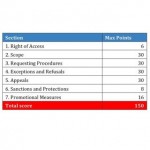 |
The 61 Indicators are drawn from a wide range of international standards on the right to information, as well as comparative study of numerous right to information laws from around the world and pilot testing of the Methodology on selected laws.
An Advisory Council of renowned experts on the right to information (see their bios) has been advising CLD and Access Info Europe on the development of the Indicators. For more information, see our press release.
Knowledge Tools
 Since being founded in January 2010, CLD has already produced a lot of knowledge tools. An important contribution to understanding freedom of expression was a research piece on restrictions on freedom of expression, analysing the different aspects of such restrictions. Other in-depth research includes a paper on media concentration and a joint publication with other organisations on assessing the digital communications environment in the Maldives. To access these documents, go to our Research page.
Since being founded in January 2010, CLD has already produced a lot of knowledge tools. An important contribution to understanding freedom of expression was a research piece on restrictions on freedom of expression, analysing the different aspects of such restrictions. Other in-depth research includes a paper on media concentration and a joint publication with other organisations on assessing the digital communications environment in the Maldives. To access these documents, go to our Research page.
CLD has also produced a large number of shorter publications, reports and papers on a variety of different topics and countries. These include, among others, a paper on hate speech, a report on regulatory issues in Mongolia, an academic paper on legal versus self-regulation, a paper on the 10th Joint Declaration of the four specialised international mandates for freedom of expression and a piece on a decision by the Supreme Court of Canada recognising a limited right to information as part of the constitutional guarantee of freedom of expression. To access these papers, go to our Publications/Reports/Papers page.
Providing authoritative analyses of draft laws for compliance with human rights rules can help stakeholders work on them to bring them more closely into line with international and constitutional standards. CLD has produced a large number of such analyses already, on such topics as the right to information, defamation, the rules for media during elections, and regulation of the Internet. Our legal assessments are available on our Legal Analyses page.
CLD contributes to developing foundational rights for democracy in different ways, including by contributing to documents elaborating on the content of these rights. On our Standard-Setting page, you will find our efforts in this regard, including the 10th Joint Declaration of the four specialised international freedom of expression mandates and the Brisbane Declaration, adopted at UNESCO’s 2010 World Press Freedom Day event.
Our Awareness Raising page highlights our participation in conferences that are aimed at building awareness and understanding of various foundational rights for democracy. This page also provides links to some key documents relating to these conferences.
Budget Information: Comparative Testing Study
We believe this is the most extensive cross-country exercise to access public budget information ever conducted. The six questions focus on three thematic areas closely related to the achievement of the Millennium Development Goals, maternal health, development assistance and the environment.
The three lead organisations, CLD, Access Info Europe and the IBP have worked closely with eight other international organisations focusing on the three thematic areas to develop the questions, namely the White Ribbon Alliance, Family Care International, the Averting Maternal Death and Disability Program at Columbia University, Publish What You Fund, Oxfam America, Development Initiatives, the World Resources Institute, and the International Institute for Sustainable Development. The actual requesting process was undertaken by 80 local organisations (a list is available here).
To ensure consistency of approach across the various countries, a detailed Request Protocol was developed to guide each stage of the process (available in Arabic, English, French and Spanish). The Protocol describes in some detail each step of the requesting process including how to lodge original requests, the appropriate follow-up for each possible response, and how to ensure consistent and detailed records are kept of each stage of the request process.
The exercise has generated an impressive database of information both about the three thematic areas and about the manner in which the 80 different countries process requests for information. They confirm what researchers already suspected, namely that budget transparency in countries around the world is deplorable. But they also point to a number of interesting trends and conclusions.
Some of these are rather surprising. For example, the results demonstrate quite clearly that the so-called established democracies with long-standing right to information laws perform far less well in terms of responding to requests about budget information than some of the newer democracies of East and Central Europe. Others results are more expected, for example that countries with right to information laws tend to do much better in terms of budget openness than those without such laws.
CLD, AIE and IBP, along with several of the other international organisations involved in this project, have already published a 2-page Factsheet outlining some of the key results. These organisations are currently working on a far more detailed study assessing the results from a right to information perspective, which will be published shortly.
Legal Analyses: South Asia
Providing analyses of draft or adopted laws and policies affecting foundational rights for democracy is an important part of CLD’s work. So far this year, it is already produced 11 such analyses (these are described under Legal Analyses). These analyses assess the proposed rules in relation to international and constitutional standards, providing recommendations so as to ensure greater compliance with these standards.
The Maldives analysis noted that the Bill was a progressive draft, which would go a long way to giving effect to the right to information. At the same time, it highlighted some areas that needed further attention. These included the need to expand the scope of the Bill to include the Majlis (parliament) and judiciary, removing the requirement that requests for information state a valid purpose, providing for the right to information law to override other laws to the extent of any inconsistency, tightening up the regime of exceptions and expanding the powers of the Information Commissioner to allow the office to view confidential documents and to proactively compel compliance.
The Note on the Draft Right to Information Law of Pakistan also emphasised the positive features of the draft in terms of giving effect to the right to information. However, to bring the draft Law more fully into line with international and comparative standards would require broader proactive disclosure obligations, a narrowing of the scope of the regime of exceptions, including by strengthening the public interest override, clear timelines for the processing of internal appeals, and the possibility of external appeals to an independent administrative oversight body with the power to make binding orders.






